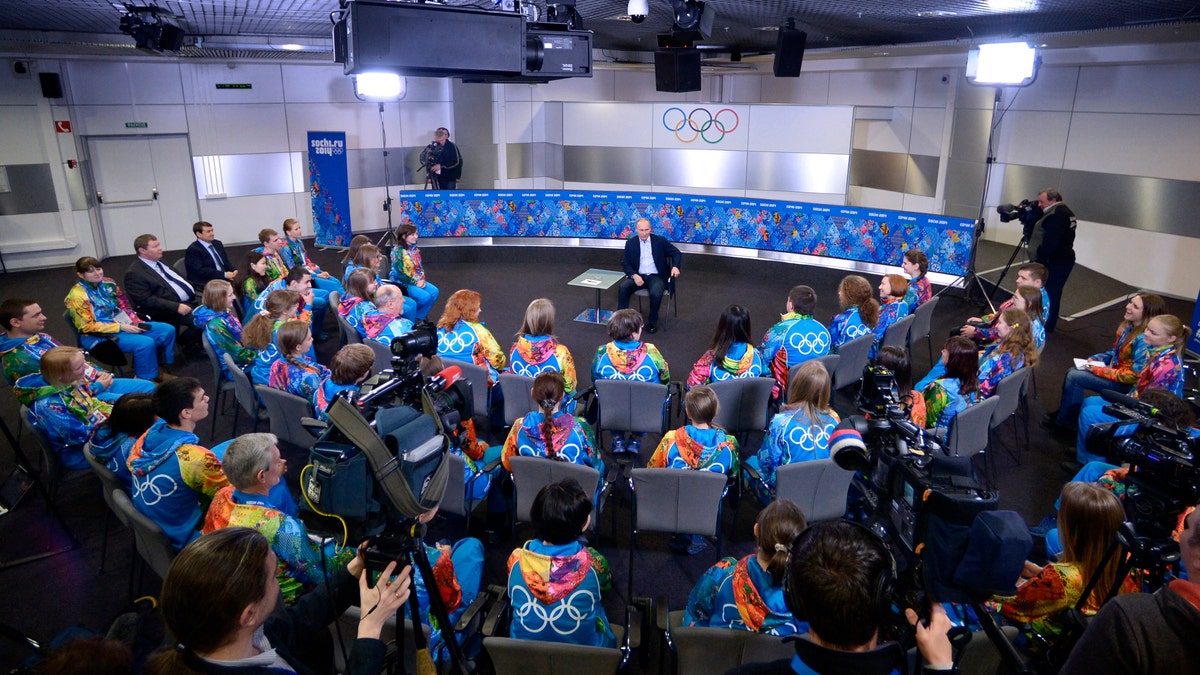
Jan. 17, 2014 - Russian President Vladimir Putin speaks at his meeting with Olympic volunteers in the Black Sea resort of Sochi, Russia. (AP)
SOCHI, Russia – President Vladimir Putin vowed Friday that Russia will do everything it can to ensure a safe Winter Olympics without making security measures too intrusive.
Concerns for the Sochi Games, which run Feb. 7-23, have been heightened by back-to-back suicide bombings in the southern city of Volgograd. Putin tried to assuage fears about safety, while assuring visitors that the atmosphere would remain festive.
"We will try to make sure that the security measures taken aren't too intrusive or visible and that they won't put pressure on the athletes, guests and journalists," Putin said. "At the same time, we will do our best to ensure that these measures are efficient."
No one has claimed responsibility for the late December bombings, which killed 34 people and wounded 100 others in Volgograd, about 400 miles from where the Sochi Games will be held. But the bombings followed Chechen warlord Doku Umarov's call to launch attacks on the games.
Putin expressed confidence that terrorists won't succeed.
"If we allow ourselves to show weakness and fear, display our fear, then we will be helping the terrorists to achieve their goals," Putin said, adding that the international community should pool efforts in the fight against terrorism.
An insurgency seeking to create an independent Islamic state in the Caucasus has swept the region after two separatist wars in Chechnya. Chechnya's Moscow-backed strongman, Ramzan Kadyrov, claimed Thursday that Umarov was dead, but he offered no proof to the claim he had repeatedly made in the past.
The province of Dagestan, located between Chechnya and the Caspian Sea, about 300 miles east of Sochi, has become the epicenter of the rebellion, with daily shootings and bombings of police and other officials.
A car bomb Friday wounded nine people, including two police officers, in the provincial capital, Makhachkala, regional police spokeswoman Fatima Ubaidatova said.
Ubaidatova said unidentified attackers first fired a rocket-propelled grenade at a restaurant. No one was hurt, but when police arrived at the scene, a bomb placed in a car parked nearby went off.
In response to the threat posed by the Islamist insurgency, Sochi has some of the most extensive identity checks and sweeping security measures ever seen at an international sports event. Tens of thousands of police, army and other security forces have been deployed to protect the games.
Anyone wanting to attend the Olympics has to buy a ticket online from the organizers and obtain a "spectator pass" for access. Doing so will require providing passport details that allow authorities to screen all visitors.
The maximum security regime already was introduced in Sochi a month before the games' start. Every person entering the city's train station has to undergo a body search, and an AP reporter in Sochi repeatedly witnessed police officers patrolling trains, walking back and forth down the aisle at short intervals.
Putin denied the Olympics are a vehicle to satisfy his personal ambitions and insisted they serve national interests: "This isn't about my personal ambitions," Putin said. "It's about the direct and concentrated interest of the state and our people."
He argued the Sochi Olympics will help Russia regain its pride following the Soviet collapse and two separatist wars in Chechnya.
"After the collapse of the Soviet Union, after the tough and bloody events in the Caucasus, the society was in a pitiful, pessimistic state," Putin said. "We need to shake that off. We need to understand and to feel that we can fulfil large-scale projects."
